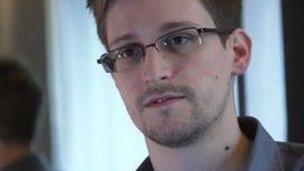MEPs vote to suspend US data sharing
- Published

The European Parliament has voted to suspend the sharing of financial data with the US, following allegations that citizens' data was spied on.
The allegation forms part of leaked documents from whistleblower Edward Snowden.
The vote is non-binding but illustrates MEPs' growing unease over how much data was shared with the US.
It comes a day after it was alleged that German Chancellor Angela Merkel's mobile phone calls were monitored.
The European Parliament voted to suspend its Terrorist Finance Tracking Program (TFTP) agreement with the US, in response to the alleged tapping of EU citizens' bank data held by the Belgian company SWIFT.
The agreement granted the US authorities access to bank data for terror-related investigations but leaked documents made public by whistleblower Edward Snowden allege that the global bank transfer network was the target of wider US surveillance.
MEPs also want to launch a full inquiry into the alleged spying.
Merkel phone
The row over exactly how much snooping was done on European citizens appears to be escalating.
Germany has summoned the US ambassador in Berlin over the claims that the US monitored Mrs Merkel's mobile phone calls.
Other leaders are also likely to want further clarification from Washington over the activities of its National Security Agency (NSA) in Europe.
Meanwhile student group, europe v facebook, is launching a fresh attack on how deeply the social network was involved in the US spying programme.
It has won the right for a review of why the Irish data protection commissioner is not investigating the amount of European data shared with the US.
Commissioner Billy Hawkes has previously claimed that there "is nothing to investigate" over Facebook's role in the PRISM programme.
Max Schrem, who heads the group, remains unconvinced.
"When it comes to the fundamental rights of millions of users and the biggest surveillance scandal in years, he will have to take responsibility and do something about it," he said.
- Published24 October 2013
- Published17 January 2014
- Published17 October 2013